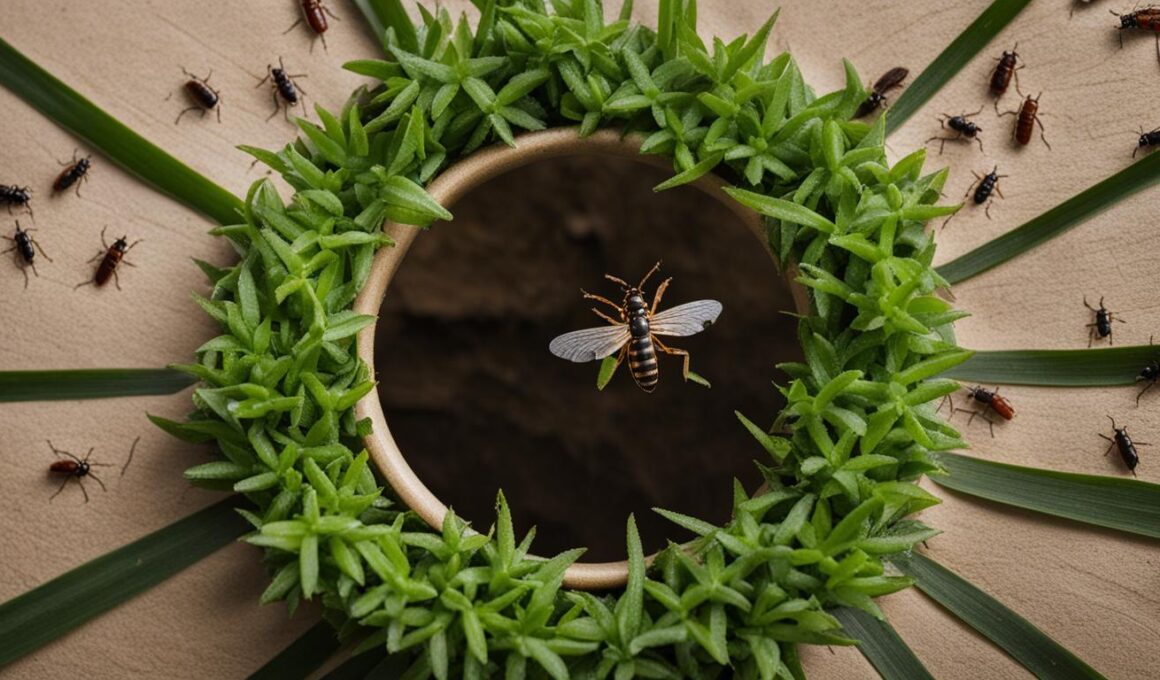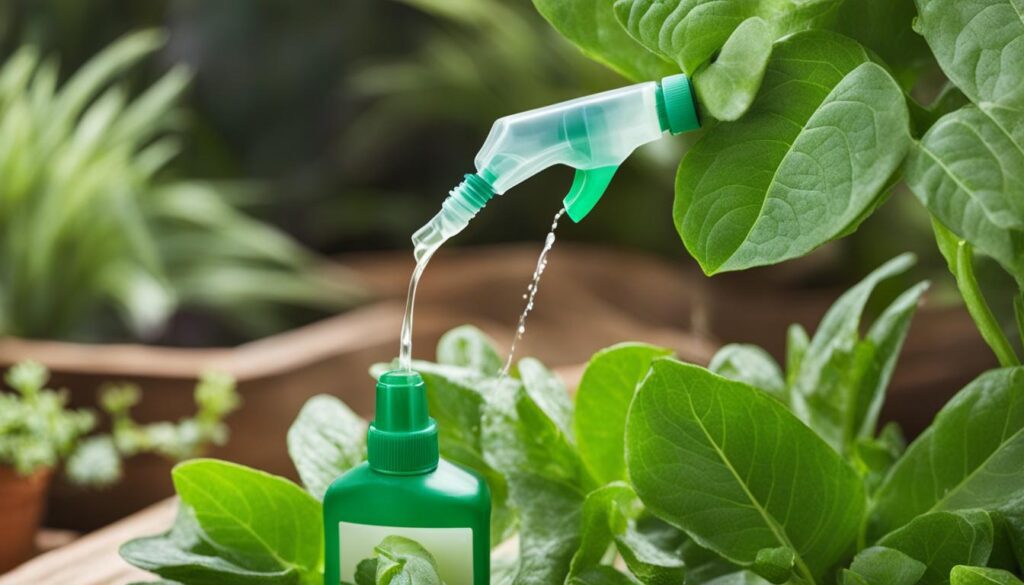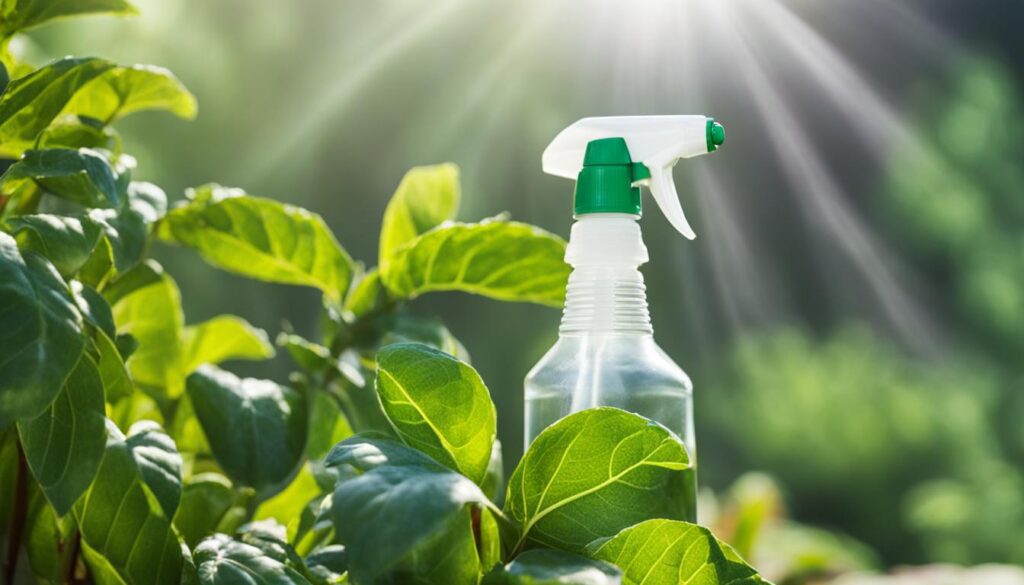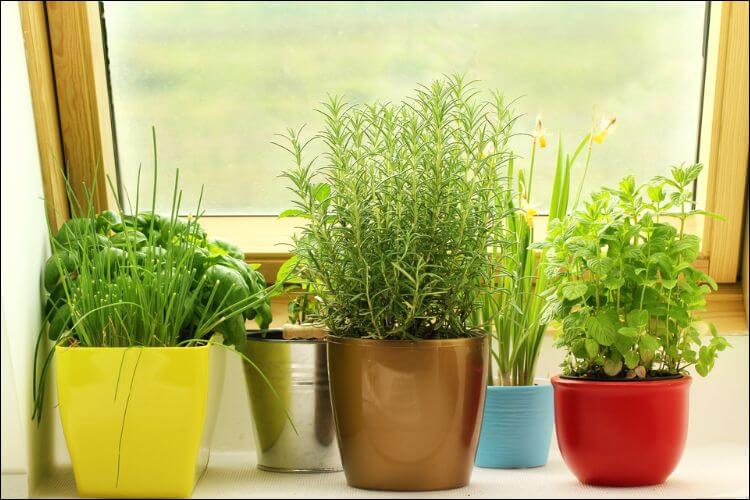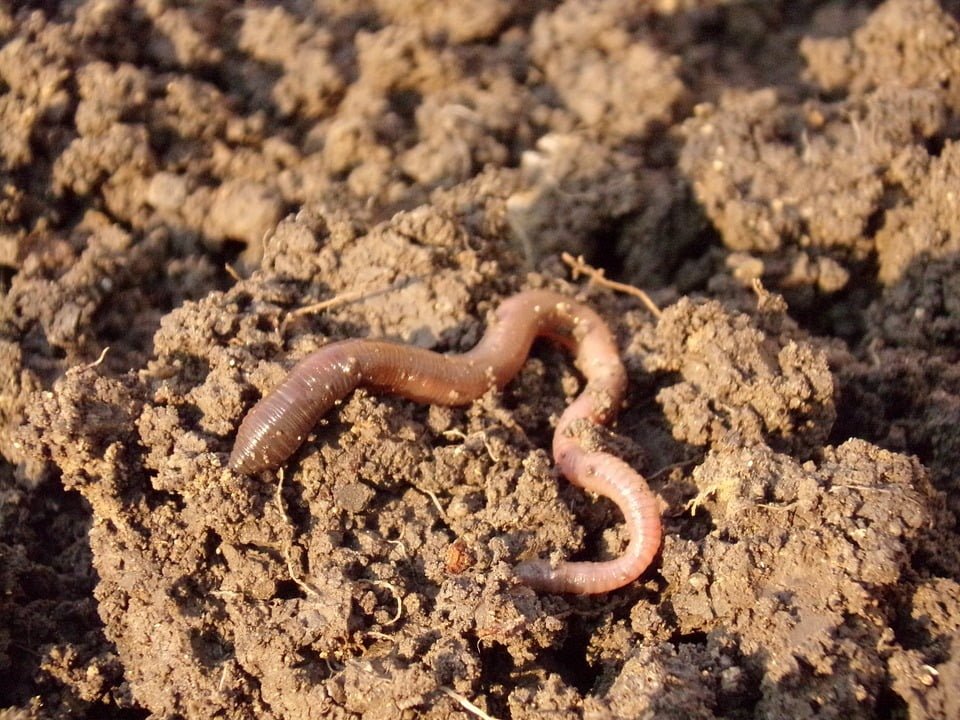Protecting your plants from pests can be a challenging task, especially when many commercial insecticides contain toxic chemicals. Luckily, there is a safer and effective alternative – homemade bug sprays. By using simple ingredients that you may already have in your pantry, you can create bug sprays that are gentle on plants but tough on pests. Say goodbye to harmful chemicals and hello to a healthier garden!
Homemade bug sprays are not only safe for your plants, but they also promote a healthy ecosystem in your garden. These natural solutions can be used as a short-term strategy to combat pests, while still maintaining the overall balance of your garden. Let’s explore some of the best homemade bug sprays that will help you protect your plants without causing harm.
Key Takeaways:
- Commercial insecticides may contain toxic chemicals that can be harmful to your plants.
- Homemade bug sprays offer a safe and effective alternative for pest control.
- Using ingredients like garlic, neem oil, vinegar, and cinnamon, you can create bug sprays that are gentle on plants but tough on pests.
- Homemade bug sprays promote a healthy ecosystem in your garden.
- Experiment with different homemade bug sprays to find the ones that work best for your specific pest problems.
Homemade Insecticidal Soap for Pest Control
Pests can wreak havoc on your plants, but you don’t have to resort to harsh chemical insecticides to protect them. Instead, you can make your own insecticidal soap at home using simple ingredients. Insecticidal soap is a natural and effective bug spray that can help control a wide range of common garden pests.
To make your homemade insecticidal soap, you’ll need a few basic items: vegetable oil, dishwashing soap or pure Castile liquid soap, and warm water. Mix these ingredients together in the right proportions and dilute the mixture in a spray bottle. Now you have a powerful bug spray that is safe for your plants and the environment.
Insecticidal soap works by suffocating pests on contact. It is effective against aphids, lacebugs, leafhoppers, mealybugs, and thrips, among others. When using insecticidal soap, be sure to thoroughly cover the affected plants, paying attention to the undersides of leaves where pests often hide. Repeat the application as needed, especially if the infestation persists.
Insecticidal soap is a short-term solution for pest control, and it can be used in conjunction with other organic pest control methods. Regular monitoring of your plants and implementing good cultural practices such as proper watering and regular pruning can also help prevent pest infestations. By incorporating homemade insecticidal soap into your gardening routine, you can enjoy a healthy and vibrant garden, free from harmful pesticides.
Benefits of Homemade Insecticidal Soap
- Safe for plants and the environment
- Effective against a wide range of garden pests
- Easy to make using common household ingredients
- Does not harm beneficial insects
- Can be used as part of an integrated pest management approach
“Homemade insecticidal soap is a great alternative to chemical insecticides. It’s safe, effective, and easy to make at home.” – Gardening expert
Neem Oil Bug Spray for Organic Pest Control
When it comes to organic pest control, neem oil bug spray is a highly effective solution. Derived from the seeds of the neem tree, neem oil has been used for centuries in India as a natural insecticide. What makes neem oil so powerful is that it not only kills pests, but it also disrupts their reproductive cycle, ensuring long-term control.
Neem oil is effective against a wide range of pests, including mites, whiteflies, aphids, thrips, and mealybugs. It can be used at every stage of their life cycle, making it an ideal choice for gardeners looking for a comprehensive pest control solution. Additionally, neem oil is safe for beneficial insects and does not harm birds or pets, making it an environmentally friendly option.
To make neem oil bug spray, simply mix pure, cold-pressed neem oil with water. Optionally, you can add a small amount of dish soap to help the neem oil adhere to plant surfaces. It’s important to cover both the tops and undersides of leaves when applying the spray to ensure maximum effectiveness. Neem oil bug spray can be used as a preventative measure or as a treatment for existing infestations. For best results, it’s recommended to apply neem oil bug spray in the early morning or late evening when the temperature is cooler.
Benefits of Neem Oil Bug Spray:
- Organic and natural: Neem oil is a safe and environmentally friendly alternative to synthetic pesticides.
- Effective against a wide range of pests: Neem oil kills and controls pests at every stage of their life cycle.
- Safe for beneficial insects: Neem oil does not harm bees, ladybugs, or other beneficial insects.
- Long-lasting control: Neem oil disrupts the reproductive cycle of pests, ensuring long-term control.
- Prevents powdery mildew: Neem oil has antifungal properties and can help prevent powdery mildew on plants.
Using neem oil bug spray in your garden not only helps control pests but also promotes a healthy and thriving ecosystem. By choosing organic pest control methods like neem oil, you can protect your plants without harming the environment.
Vinegar Spray for Natural Pest Control
When it comes to natural pest control, vinegar spray is a versatile and effective option. This homemade bug spray can repel a wide range of garden pests, making it a valuable addition to your arsenal of pest control solutions.
Why Choose Vinegar Spray?
Vinegar spray is a natural pest repellent that is safe for both your plants and the environment. It can be used to deter insects such as aphids, whiteflies, and ants. Vinegar spray works by disrupting the pests’ sense of smell and taste, making your plants less appealing to them. It can also help prevent future infestations by leaving a scent trail that repels pests.
“Vinegar spray is an affordable and eco-friendly way to protect your plants from common garden pests. It’s easy to make and can be used as a preventive measure or as a targeted treatment for existing infestations.” – Gardening Enthusiast
To create vinegar spray, simply mix equal parts of water and vinegar in a spray bottle. For added effectiveness, you can also add a small amount of dishwashing soap to help the mixture adhere to plant surfaces. Be sure to spray both the tops and undersides of leaves, as many pests lay their eggs on the undersides.
Enhancing Vinegar Spray
If you find the smell of vinegar too strong, you can add a few drops of essential oils such as peppermint or eucalyptus to the mixture. This not only helps mask the vinegar odor but also adds an extra layer of pest deterrence. Additionally, adding a few lemon peels to the spray can provide a citrusy scent that pests find unpleasant.
Remember to test the vinegar spray on a small area of your plants before applying it fully, as some delicate or sensitive plants may be more prone to damage. Regular application of vinegar spray can help keep your plants pest-free and promote a healthy garden ecosystem.
Garlic and Tomato Leaf Sprays for Pest Deterrence
If you’re looking for natural and effective ways to deter pests in your garden, look no further than garlic spray and tomato leaf spray. These homemade bug sprays utilize the power of garlic and tomato leaves to repel common garden pests, such as aphids, slugs, and mites. Not only are these sprays easy to make, but they are also safe for your plants and beneficial insects.
To create garlic spray, start by pureeing garlic bulbs with vegetable oil. Let the mixture sit overnight, then strain it and add liquid soap and water. This potent concoction can be applied to both sides of leaves, creating a strong deterrent for pests. It’s important to reapply the spray every few days for infestations to ensure its effectiveness.
Tomato leaf spray is another effective pest deterrent that is simple to make. Begin by chopping up tomato leaves and mixing them with water. Let the mixture steep overnight, then strain it. This natural spray contains alkaloids that are toxic to aphids and mites. Apply the tomato leaf spray directly to the leaves of your plants to keep pests at bay.
Pest deterrence tips:
- Apply garlic spray and tomato leaf spray consistently for best results.
- Focus on spraying the undersides of leaves, as this is where many pests lay their eggs.
- Rotate between garlic spray and tomato leaf spray to prevent pests from building up resistance.
- Consider companion planting with garlic and tomatoes to enhance the effectiveness of these natural pest repellents.
With garlic spray and tomato leaf spray, you can protect your plants from common garden pests without resorting to harmful chemicals. Embrace the power of nature and keep your garden thriving!
Cinnamon Spray for Pest Control and Fungus Prevention
Pests and fungal infections can wreak havoc on your plants, but there is a natural solution that can help you combat these issues – cinnamon spray. This homemade bug spray not only repels pests but also prevents the growth of fungus, keeping your plants healthy and thriving.
Cinnamon spray is easy to make. Simply mix cinnamon powder with warm water and let it steep overnight. Strain the mixture and transfer it to a spray bottle. Now, you have a powerful and natural bug spray at your disposal.
One of the main benefits of cinnamon spray is its effectiveness against ants. Ants are not only pesky but can also cause damage to your plants. By creating a barrier around dining or patio areas with cinnamon spray, you can keep ants at bay and enjoy your outdoor space without any unwanted guests.
Benefits of Cinnamon Spray:
- Repels pests such as aphids, ants, and other insects
- Prevents the growth of fungus and other plant diseases
- Safe for plants and beneficial insects
- Easy to make with readily available ingredients
- Environmentally friendly alternative to chemical insecticides
“Cinnamon spray is a natural and effective way to protect your plants from pests and fungal infections. It’s a safe and easy-to-make solution that can be used on a variety of plants without harming beneficial insects. Plus, the pleasant aroma of cinnamon adds an extra touch to your garden.”
When using cinnamon spray, be sure to thoroughly coat the plant leaves, stems, and soil. Reapply the spray every few days or after rainfall to maintain its effectiveness. Remember, prevention is key when it comes to pest control and fungus prevention.
With cinnamon spray, you can keep your plants healthy and free from pests and diseases the natural way. Give it a try and see the amazing results for yourself!
Conclusion
Protecting your plants from pests while keeping them healthy is crucial for every gardener. Homemade bug sprays provide a safe and effective solution that is gentle on your plants yet tough on pests. By utilizing ingredients such as insecticidal soap, neem oil, vinegar, garlic, tomato leaves, and cinnamon, you can create bug sprays that deter pests and prevent fungal diseases.
Incorporating natural pest control methods into your gardening routine not only protects your plants but also promotes a healthy ecosystem. By diversifying your plant selection and practicing companion planting, you can reduce the need for bug sprays altogether.
Experiment with these homemade bug sprays to find the ones that work best for your specific pest problems. Remember, bug sprays that are safe for your plants and the environment are always the best choice. Say goodbye to harmful chemicals and embrace the power of natural pest control with homemade insecticides.
Is Bug Spray Safe for Plants and Are There Any Natural Alternatives?
Yes, bug spray is safe for plants, as long as it is specifically formulated for use on plants and does not contain harsh chemicals. There are also natural alternatives such as neem oil, garlic spray, and insecticidal soap that are effective at keeping pests away without harming your anti bug spray plants.
FAQ
Are homemade bug sprays safe for plants?
Yes, homemade bug sprays are safe for plants. They are made using natural ingredients that are gentle on plants but tough on pests.
What pests can homemade bug sprays control?
Homemade bug sprays can control a wide range of pests, including aphids, whiteflies, mites, mealybugs, thrips, and more.
How do I make insecticidal soap at home?
To make insecticidal soap, mix vegetable oil, dishwashing soap or pure Castile liquid soap, and warm water. Dilute the mixture in a spray bottle and apply to affected plants.
Can neem oil be used as a natural insecticide?
Yes, neem oil is an effective organic insecticide that can control pests at every stage of their life cycle. It is safe for beneficial insects and does not harm birds or pets.
How do I make vinegar spray for pest control?
Mix vinegar with water and a small amount of dishwashing soap to create a natural pest control spray. Spray the undersides of leaves to target eggs and directly apply to affected areas.
How can I use garlic and tomato leaves to deter pests?
To make garlic spray, puree garlic bulbs with vegetable oil, strain, and add liquid soap and water. Tomato leaf spray is made by mixing chopped-up tomato leaves with water. Both sprays can be applied to leaves to deter pests.
Can cinnamon spray prevent pests and fungus?
Yes, cinnamon spray can be used as a natural bug spray and to prevent fungus in your garden. Mix cinnamon powder with warm water, strain, and spray it on the soil and plants.





